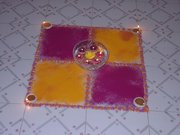Diwali
|
|
Diwali is the Hindu Festival of Lights and marks the victory of good over the evil. Held on the final day of the Vikram calendar, one type of a Hindu calendar that is followed by North Indians. The following day, marking the beginning of a new year, for North Indians, entitled Annakut.
In South India, Diwali does not coincide with the beginning of a new year as South Indians accordingly follow a different calendar, Shalivahana calendar. In South India, the new year, entitled Ugadi, is followed by persons in Andhra Pradesh and Karnataka. Vishu and Varsha Pirappu are celebrated in Kerala and Tamil Nadu respectively. These festivals occur at about the same time, generally during April. references: [1] (http://www.hindutemple.org/brochures/tamil_new_year_celebrations_2003.htm) and [2] (http://www.saja.org/stylebook.html#D) (Diwali definition; Excerpt from saja.org: Diwali should not be referred as the Hindu New Year as the new year is celebrated at different times.)
| Contents |
Date
The Hindu calendar is a lunar calendar, with most years consisting of 12 lunar cycles and an extra month inserted approximately every seven years to resynchronize the calendar with the seasons.
Dipavali falls in the Gregorian month of October or November, and always on a new moon day. Since the precise moment of the new moon falls on different Gregorian dates depending on geographical location, the date of Dipavali also depends on one's location.
In 2003, Dipavali fell on Friday, October 24 for many Indian states and on Saturday, October 25 for the remainder of India as well as for North America.
In 2004, Dipavali fell on November 12 in the United Kingdom and the United States.
In 2005, the estimated date for Dipavali is November 1.
In 2006, it will be on about October 25.
Significance
It is celebrated by Hindus all over the world, every year. On the day of Dipavali, old and young, rich and poor wear new dresses and share sweets. They also burn fire crackers. The North Indian business community starts their financial new year on Dipavali and new account books are opened on this day.
There are two mythological legends associated with Dipavali. The first Dipavali was held to celebrate the return of the Rama, King of Ayodhya, his wife Sita and brother Lakshmana to Koshala after a war in which he killed the demon Ravana. It was getting dark, so people along the way lit oil lamps to light their way. Second, it commemorates the killing of Narakasura, an evil demon by Lord Krishna. So Dipavali is a festival symbolising the destruction of evil forces.
There are various legends relating to Dipavali as also different ways of celebrating in different parts of India. Dipavali is celebrated over five days in most of North India as:
- dhan teras
- narak chaudas - Chhoti diwali
- deepawali - ba.Dii diwali
- annakuuTa
- bhai duuj
In South India, naraka chaturdashii is the main day of celebration with lot of fire crackers at dawn while in North India the main celebration is on Amavasya evening with Lakshmi Puja followed by lighting of oil lamps in and around the house and bursting of crackers.
Missing image
Diwali2.gif
Image:diwali2.gif
In England, the days are Dhanteras, Narak Chatrudashi, Lakshmi-Puja, the most important day, Padwa or Varshapratipanda and Bhaiya Dooj or the Teeka Ceremony [3] (http://www.leicester.gov.uk/departments/page.asp?pgid=6490).
In Trinidad and Tobago, the day of Divali is a public holiday and celebrations precede the Lakshmi-Puja day for almost two weeks. This event is one of the foremost religious observances for the country. More information about the celebrations in Trinidad and Tobago can be found at http://www.visittnt.com/ToDo/Events/Divali/Introduction.htm
The time is also significant to Sikhs. During the festival time in 1620, the sixth Guru, Hargobind Singh, gained the release of 52 Hindu princes who had been falsely imprisoned in Gwallior Fort by the rulers of the area, the Mughals. The Golden Temple was lit with many lights to welcome the release of Guru Hargobind and Sikhs have continued the celebration.
The Jain also celebrate this time, as a celebration of the establishment of the dharma by Lord Mahavira.
In recent years there has been some criticism about the the use of firecrackers during the festival of Diwali. The most common reason is the noise pollution caused by firecrackers, which particularly affects infants, pets and older people whose sleep can also be disrupted by firecracker noise that continues late into the night.Harmful effects of firecrackerts.
Trivia
The festival generates enough interest around the world that the search for diwali greetings (http://www.google.com/search?q=diwali+greetings) was the 2nd of the top 10 gaining Google queries for the week ending October 27, 2003 [4] (http://www.google.com/press/zeitgeist/weeks-oct03.html).
External links
- BBC Diwali information (http://www.bbc.co.uk/religion/religions/hinduism/holydays/diwali/index.shtml)
- BBC: Personal report on Hindu Diwali celebrations in UK (http://news.bbc.co.uk/cbbcnews/hi/newsid_4000000/newsid_4006100/4006167.stm)
- JnanaBase information on Diwali (http://jnana.wikinerds.org/index.php/Diwali)
- Diwali- The Festivals of Lights (http://www.rudraksha-ratna.com/diwali.htm)
| Hinduism | Hindu festivals | Hindu calendar |
| Pongal | Holi | Ugadi | Ram Navami | Krishna Janmaashtami | Onam |
|
Ganesha Chaturthi | Vijayadashami | Dasara | Navratri | Diwali | Thaipusam |
| Sacred Days: Maha Shivratri | Ekadasi | Vaikunta Ekadasi | MahaLakshmi vratha |

